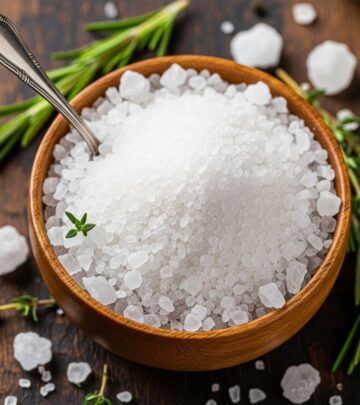9 Dangerous Side Effects of Eating Too Many Walnuts
Overindulging in this popular nut can lead to health issues beyond its benefits.

Walnuts are often lauded as a superfood, rich in omega-3 fatty acids, antioxidants, and vital nutrients. While moderate consumption delivers substantial health benefits, excessive intake can trigger adverse health effects in some individuals. Here, we systematically break down the lesser-known—and sometimes dangerous—side effects, who is most at risk, and what you should look out for if walnuts are a regular part of your diet.
Table of Contents
- 1. Allergic Reactions
- 2. Digestive Disturbances
- 3. Weight Gain and Obesity Risk
- 4. Reduced Mineral Absorption
- 5. Increased Risk of Kidney Stones
- 6. Gut Microbiota Imbalance
- 7. Risks During Pregnancy And Breastfeeding
- 8. Medication and Cross-Allergy Interactions
- 9. Possible Skin Irritation
- How Much Walnut is Safe?
- Frequently Asked Questions (FAQs)
1. Allergic Reactions
Walnut allergies can be severe and life-threatening, especially for sensitive individuals and children. Walnuts are among the top eight food allergens globally and are a common cause of anaphylaxis.
- Symptoms include itching, hives, body or facial swelling, wheezing, shortness of breath, and digestive upset (nausea, vomiting, diarrhea).
- In severe cases, walnut allergy may lead to anaphylactic shock, requiring immediate medical attention.
- Even minimal exposure can trigger reactions in extremely sensitive individuals.
People with tree nut allergies are often advised to completely avoid walnuts and foods that may be contaminated with walnut residue, as cross-contact is common in processed foods. Allergic reactions typically develop in early childhood and tend to persist throughout life.
2. Digestive Disturbances
Walnuts contain significant amounts of dietary fiber and various bioactive compounds. Eating large quantities can overwhelm the digestive system, leading to:
- Bloating
- Abdominal cramps
- Loose stools or diarrhea (especially in individuals with sensitive digestion or existing gastrointestinal disorders)
The high oil content in walnuts may stimulate intestinal movement, leading to increased stool frequency or even diarrhea. Sensitive individuals, children, and those unaccustomed to high-fiber foods are most at risk.
3. Weight Gain and Obesity Risk
While walnuts contain healthy fats, they are calorie-dense—an ounce (about 28–30g) contains roughly 185 calories. Excessive, uncontrolled snacking on walnuts can result in a significant calorie surplus, promoting unwanted weight gain and even contributing to metabolic syndrome or obesity over time.
- Overeating nuts, despite their perceived health halo, can undermine weight management efforts.
- To avoid this, nutritionists recommend portion control: stick to a small handful or 1 to 1.5 ounces (about 30–45g) per day.
Balance is key—nuts support satiety, but overindulgence may negate their cardiovascular and metabolic benefits.
4. Reduced Mineral Absorption
Phytic acid, found in walnuts, is a natural compound that can bind to essential minerals—especially iron, zinc, and calcium—and inhibit their absorption in the digestive tract.
- This effect is most significant for people with diets already low in these minerals or in populations heavily reliant on plant-based foods.
- Although modest walnut intake normally poses little risk, excessive, long-term consumption may contribute to eventual mineral deficiencies.
- Diversify your diet and avoid excessive walnut intake if you are at risk or already deficient in iron or zinc.
Phytic acid’s impact is usually negligible in the context of a balanced diet. However, excessive intake over time can increase the risk for mineral deficiencies, especially in susceptible individuals.
5. Increased Risk of Kidney Stones
Walnuts contain oxalates, naturally occurring compounds that, in high concentrations, can contribute to the formation of calcium oxalate kidney stones.
- This is of particular concern for individuals with a personal or family history of kidney stones.
- Oxalates, paired with low dietary calcium, heighten the risk by facilitating the precipitation of insoluble crystals in the urinary tract.
- Drinking plenty of water and moderating walnut intake is recommended for at-risk populations.
If you are prone to kidney stones or have been advised to limit dietary oxalates, walnuts should be eaten in moderation.
6. Gut Microbiota Imbalance
In normal amounts, walnuts are considered prebiotic foods, supporting a healthy gut microbiome. However, excessive intake can disrupt gut bacterial balance—potentially leading to an overproduction of short-chain fatty acids and gastrointestinal discomfort, such as gas, bloating, and irregular bowel movements.
- Gut discomfort is typically reversible by reducing walnut consumption.
- Excessive intake may exacerbate symptoms in individuals with irritable bowel syndrome (IBS) or sensitive GI tracts.
Moderate, consistent walnut consumption is more beneficial for gut health than sporadic, excessive intake.
7. Risks During Pregnancy and Breastfeeding
Walnuts—especially black walnuts and their extracts—should be approached with caution during pregnancy and breastfeeding.
- Although ordinary consumption in food amounts is generally considered safe, medicinal doses or non-food parts (like hulls or bark) may be unsafe.
- There is a lack of high-quality scientific evidence about safety at high doses or in supplement form during pregnancy and lactation.
To err on the side of caution, pregnant or breastfeeding women should avoid excessive walnut intake and all walnut-derived supplements, particularly from black walnut bark or leaves.
8. Medication and Cross-Allergy Interactions
Walnuts naturally contain vitamin K, which can interfere with anticoagulant medications such as warfarin.
- Large swings in vitamin K intake can reduce the effectiveness of blood-thinning drugs, leading to complications for patients with clotting disorders.
- People taking anticoagulant medications should consult a healthcare professional before increasing or decreasing walnut intake.
- Walnuts can also cross-react with other nuts or allergies, increasing the risk for individuals allergic to tree nuts or peanuts.
If you are on blood-thinners or have multiple food allergies, medical advice is recommended before including walnuts as a dietary staple.
9. Possible Skin Irritation
Some walnut species, such as black walnut, contain naturally occurring chemicals like juglone and tannins that can irritate the skin when handled or applied topically.
- Contact with walnut shells, husks, or preparations can cause redness, inflammation, and dermatitis in sensitive individuals.
- Oral intake of black walnut bark or excessive use may also cause gastrointestinal and liver upsets.
People with sensitive skin, allergies, or a history of skin reactions should be cautious when handling walnut shells or using topical walnut-based products.
How Much Walnut is Safe to Eat?
The general dietary recommendation is to limit your walnut consumption to a small handful (28–45 grams, or about 1–1.5 ounces) per day.
- This serving is enough to deliver the proven cardiovascular and metabolic benefits of walnuts without exposing you to excess calories and side effects.
- If you have a history of allergies, kidney stones, are pregnant, or take blood-thinning medication, speak to a healthcare provider before adding walnuts to your routine.
Moderation and dietary balance are the keys to realizing the health benefits of walnuts while minimizing their risks.
Frequently Asked Questions (FAQs)
Q1: How can I tell if I am allergic to walnuts?
Symptoms of walnut allergy may appear within minutes to a few hours after consumption or exposure. Look for itchy rashes, swelling (especially around the face and lips), hives, shortness of breath, or digestive disturbances. Consult an allergist for diagnosis if you suspect a walnut allergy.
Q2: Do walnuts cause kidney stones in everyone?
No, walnuts only increase the risk for individuals predisposed to calcium oxalate kidney stones or those who already consume diets high in oxalates and low in calcium. If you have a family or personal history, monitor your walnut and oxalate intake closely and stay hydrated.
Q3: Can children safely consume walnuts?
Yes, unless allergic. Walnuts can be introduced into the diet after age three, but parents should always watch for allergic reactions and ensure nuts are finely ground or crushed to prevent choking in young children.
Q4: Can walnuts disrupt medication regimens?
Yes, walnuts’ vitamin K content can interfere with anticoagulant (blood-thinning) medications such as warfarin. Always consult your doctor before significantly changing your walnut intake if you are on such medications.
Q5: Are shelled or unshelled walnuts better for digestion?
There is no significant nutritional difference between shelled and unshelled walnuts, but always ensure freshness to avoid digestive upset caused by rancid nuts. Whole, raw walnuts may retain nutrients better if kept in airtight storage.
References
- Cited, synthesized, and paraphrased from: MedicineNet, Healthline, Times of India, WebMD, and academic literature on walnut nutrition and safety.
References
- https://www.medicinenet.com/what_happens_if_you_eat_walnuts_every_day_benefits/article.htm
- https://www.healthline.com/nutrition/foods/walnuts
- https://timesofindia.indiatimes.com/life-style/health-fitness/health-news/eating-too-many-walnuts-can-have-these-hidden-side-effects/articleshow/116342275.cms
- https://www.webmd.com/vitamins/ai/ingredientmono-639/black-walnut
- https://www.stylecraze.com/articles/dangerous-side-effects-of-walnuts/
- https://www.uhhospitals.org/blog/articles/2023/01/can-you-overdose-on-nuts
- https://pmc.ncbi.nlm.nih.gov/articles/PMC2696995/
- https://www.medicalnewstoday.com/articles/324629
- https://www.webmd.com/vitamins/ai/ingredientmono-127/english-walnut
Read full bio of Sneha Tete












